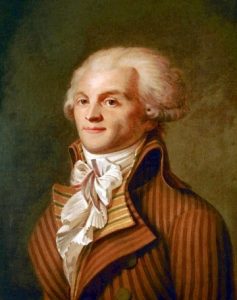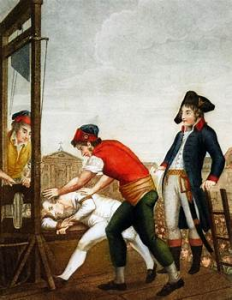By Their Fruits You Will Know Them

Maximilien de Robespierre was a French lawyer and statesman who became one of the best-known, influential, and controversial figures of the French Revolution. Robespierre played an important role in the fall of the French monarchy on the 10th of August 1792 and the summoning of a National Convention.
As a member of the Estates-General, the Constituent Assembly, and the Jacobin Club, he campaigned for universal manhood suffrage, the right to vote for people of color, Jews, actors, domestic staff, for the abolition of slavery in France and its colonies and ending French involvement in the Atlantic slave trade. He was an outspoken advocate for male citizens without a political voice, for their unrestricted admission to the National Guard, to public offices, and to the commissioned ranks of the army, for the right to petition and the right to bear arms in self-defense. His goal was to create a unified France, where each man had equality before the law, to abolish prerogatives and to defend the principles of direct democracy. Judging by the issues he stood for, this fighter for social justice resembled the American Founding Fathers. In July 1793, this opponent of the death penalty was appointed as a member of the Committee of Public Safety, which had been reorganized into the Revolutionary Tribunal. Under his management, within one year during the Reign of Terror over 300,000 were arrested, more than 17,000 people were executed and at least 10,000 died in prison without trial. To understand what happened, let us look into his life story.
Maximilien François Marie Isidore de Robespierre was the eldest of four children, born on the 6th of May, 1758, in Arras, in the old French province of Artois into a family of lawyers. His grandfather, also named Maximilien de Robespierre, established himself in Arras as a lawyer, as did his father François Maximilien Barthélémy de Robespierre.
Robespierre was only six years old when his mother died after giving birth to a stillborn daughter in July 1764. Abandoned by his father, he was taken in and raised by his grandparents, who made the necessary preparations to secure his brilliant future in the family trade. And brilliant he was, at the age of eight he started attending the middle school (collège of Arras). Two years later he received, on the recommendation of bishop Louis-Hilaire de Conzié, a scholarship at the Collège Louis-le-Grand in Paris. In 1776 he was awarded first prize for rhetoric. Then he studied law for three years at the Sorbonne. Upon his graduation on the 31th of July, 1780, he received a special prize of 600 livres for exemplary academic success and personal good conduct. On the 15th of May, 1781, Robespierre gained admission to the bar. In March of the next year, the bishop of Arras, Hilaire de Conzie, appointed him a judge at the Salle Épiscopale, a court with jurisdiction over the provostship of the diocese. This appointment gained him prestige at Arras. In 1783, at the age of 25 was admitted to the Arras Academy and soon became its chancellor and later its president. His 1784 essay on the question of whether the relatives of a condemned criminal should share his disgrace, awarded him a medal Academy of Metz. At the same time his private practice providing him with comfortable income gained him the reputation of a lawyer for the poor. The concepts of individual responsibility and being charitable are essential in Christianity, so in 18th century Catholic France the positions he took increased his support among the bishops, clergy, and the general community. He would take high profile, unusual cases, such as a case involving a lightning rod in St. Omer, thereby gaining national recognition and the status of a local celebrity.
When the Estates General/ National Assembly was called by King Louis XVI in 1789, Maximilian Robespierre was selected as one of 16 deputies for Pas-de-Calais department. He quickly became the most frequent speaker in assembly. In five years, between the 5th of May 1789, the first day of the assembly, and the 27th of July 1794, the day of his death, he made some 900 speeches, on average one every other day. In his first speech on June 6th, he attacked the church hierarchy, the same hierarchy which had sponsored his education and supported his brilliant career. The pretense had begun to drop, revealing that the actions and positions he had taken over the years were only a facade to fulfill his ambitions.
He became a member of the “Society of the Friends of the Constitution” also known as the Jacobin Club (also running under the banner of Equality before the law) and quickly climbed the ladder. On the 31st of March, 1790, was elected as their president. On the 19th of June he was elected secretary of the National Assembly. As powerful member of Assembly he was the loudest voice for abolishing slavery, but as a lawyer he knew that slavery was already illegal in France. Over four hundred years ago, in 1315, king Louis X had published a decree abolishing slavery and proclaiming that any slave setting foot on French ground should be freed.
As an elected representative, he supported a direct democracy, a form of democracy in which the electorate decides on policy initiatives without elected representatives.
When on the 11th of June 1791, Robespierre was elected as “public accuser” he became an outspoken advocate for male citizens “without a political voice,” for their unrestricted admission to the National Guards, gendarmerie, police reserve force, commissioned army ranks, and public offices, which were reserved for citizens with good reputations. In his speeches he provided a justification for civilian armament. These positions envisioning the poor as victims of the existing system gained Robespierre their support and created the Sans-culottes (“without breeches”), which were an armed mob of individuals with questionable character used to enforce revolutionary laws and eliminate opposition.
 In July 1793 when he was appointed to the Committee of Public Safety and organized the Revolutionary Tribunal, all the principles of democracy and equality before the law were fully swept aside and his narcissistic personality took control. His army of Sana-culottes wore dirty, ragged clothing, but he always had his hair powdered, curled, and perfumed. When the people around him were dying from starvation, eating scraps, he was served at the table first. An unwavering supporter of free speech was sentencing to death those who had objections.
In July 1793 when he was appointed to the Committee of Public Safety and organized the Revolutionary Tribunal, all the principles of democracy and equality before the law were fully swept aside and his narcissistic personality took control. His army of Sana-culottes wore dirty, ragged clothing, but he always had his hair powdered, curled, and perfumed. When the people around him were dying from starvation, eating scraps, he was served at the table first. An unwavering supporter of free speech was sentencing to death those who had objections.
He became so arrogant, that in July 1794, in his pursuit for absolute power, he announced a new wave of “purification” in the Committee of General Security, the Committee of Public Safety and members of Convention. He was arrested and executed on 28 July 1794.
Today we have many narcissists like Robespierre among us. Using the same slogans of equality, liberty, democracy and social justice, they gain more influence, accumulate more power and become more oppressive. Not by their words, nor their speeches, but by the rotten fruits of their works should they be known. They need to be exposed, for our good and their own before they become another Maximilian Robespierre, Adolf Hitler, Joseph Stalin, Pol Pot, Fidel Castro, Hugo Chávez, etc.